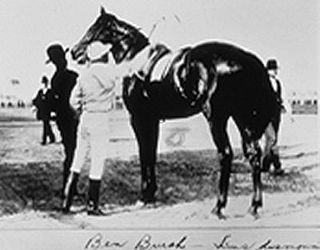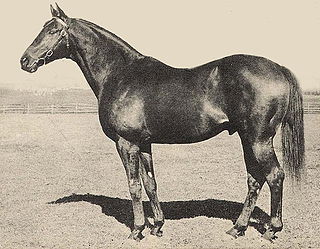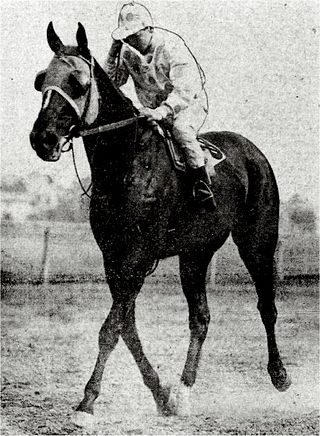Related Research Articles

The Preakness Stakes is an American thoroughbred horse race held on Armed Forces Day which is also the third Saturday in May each year at Pimlico Race Course in Baltimore, Maryland. It is a Grade I race run over a distance of 9.5 furlongs on dirt. Colts and geldings carry 126 pounds (57 kg); fillies 121 pounds (55 kg). It is the second jewel of the Triple Crown, held two weeks after the Kentucky Derby and three weeks before the Belmont Stakes.

Mr. Prospector was a Thoroughbred racehorse who became an outstanding breeding stallion and notable sire of sires. A sprinter whose career was cut short by repeated injuries, he won seven of his 14 starts, including the Gravesend Handicap at Aqueduct Racetrack and the Whirlaway Handicap at Garden State Park.
Afleet Alex is an American thoroughbred race horse who, in 2005, won two of America's classic races, the Preakness Stakes and the Belmont Stakes. He is owned by the Cash Is King Stable partnership, was trained by Tim Ritchey and was ridden by Jeremy Rose. In twelve lifetime starts, Alex won eight times, placed twice, and came in third once over 12 starts, for lifetime earnings of $2,765,800.

Hindoo (1878–1901) was an outstanding American Thoroughbred race horse who won 30 of his 35 starts, including the Kentucky Derby, the Travers Stakes, and the Clark Handicap. He later sired Preakness Stakes winner Buddhist and Belmont Stakes winner and Leading sire in North America Hanover.
Dwyer Brothers Stable was an American thoroughbred horse racing operation owned by Brooklyn businessmen Phil and Mike Dwyer.
Buckpasser (1963–1978) was a champion American Thoroughbred racehorse who was the 1966 Horse of the Year. His other achievements include 1965 Champion Two-Year-Old, 1966 Champion Three-Year-Old, 1966 Champion Handicap Horse, and 1967 Champion Handicap Horse. He was also the leading broodmare sire in 1983, 1984, and 1989.

Ben Brush (1893–1918) was a champion American Thoroughbred racehorse who won the 1896 Kentucky Derby.
Hill Prince (1947–1970) was an American Thoroughbred racehorse. He was one of the leading American two-year-olds of 1949, alongside Oil Capitol and Middleground. In 1950, he ran fifteen times, winning races including the Preakness Stakes, Wood Memorial Stakes, Withers Stakes, American Derby, Jockey Club Gold Cup, Jerome Handicap and Sunset Handicap and being named American Horse of the Year. Hill Prince raced for two further seasons and had some success despite a number of injuries and training problems. He later became a moderately successful breeding stallion.
Discovery (1931–1958) was a champion American Thoroughbred racehorse. In a racing career which lasted from 1933 to 1936 he ran sixty-three times and won twenty-seven races. One of the leading American three-year-olds of his generation in 1934, he became a dominant performer in the next two seasons. The National Museum of Racing and Hall of Fame said that he was: "...considered one of the greatest horses of the 20th century."

Bimelech was a champion Thoroughbred racehorse who won two Triple Crown races and was a Champion at both age two and three. He was ranked #84 among U.S. racehorses of the 20th century. After retiring to stud, he sired 30 stakes winners and his daughters produced 50 stakes winners.
Go And Go was an Irish Thoroughbred racehorse best known for winning an American Triple Crown race- the Belmont Stakes.
Polynesian was an American Thoroughbred racehorse and sire.

Peter Pan (1904–1933) was an American Thoroughbred racehorse and sire, bred and raced by prominent horseman, James R. Keene. As winner of the Belmont Stakes, the Brooklyn Derby and the Brighton Handicap, he was later inducted into the National Museum of Racing and Hall of Fame. His progeny included many famous American racehorses, including several winners of the Kentucky Derby and the Preakness Stakes.

Springbok (1870–1897) was an American Thoroughbred racehorse who won the seventh Belmont Stakes in 1873. Foaled in 1870, he was sired by the imported stallion Australian, his dam was a daughter of Lexington. During his racing career he started 25 races, winning 17 of them. Besides the Belmont, Springbok won the Saratoga Cup twice, in 1874 and 1875 and was named Champion Older Male horse in 1874 and 1875. After retiring from the racetrack, he sired five stakes winners and died in 1897.

Margrave was an American Thoroughbred racehorse who won the 1896 Preakness Stakes, a race that would become the second leg of the U.S. Triple Crown series.
Grenada was an American Thoroughbred racehorse. He won the 1880 Preakness Stakes, Belmont Stakes, and Travers Stakes. He is one of only seven horses to have won these three races.
Culpepper was an American Thoroughbred racehorse. He won the 1874 Preakness Stakes.
George Kinney was an American Thoroughbred racehorse best known for winning the 1883 Belmont Stakes.
Inspector B was an American Thoroughbred racehorse best known for winning the 1886 Belmont Stakes.
Burlington was an American Thoroughbred racehorse best known for winning the 1890 Belmont Stakes.
References
- 1 2 3 4 Sowers, Richard (25 February 2014). The Kentucky Derby, Preakness and Belmont Stakes A Comprehensive History. McFarland Incorporated. pp. 36–37. Retrieved 7 March 2022.
- 1 2 3 4 "Sir Dixon Horse Pedigree". Thoroughbred Database. Retrieved 7 March 2022.
- ↑ "1888 Belmont" (PDF). Retrieved 7 March 2022.
- ↑ "Racing Extra". The Evening World. 7 July 1888. Retrieved 7 March 2022.
- ↑ "The History of the Brooklyn Handicap". The Brooklyn Daily Eagle. 2 June 1896. Retrieved 7 March 2022.
- ↑ Merry, Thomas B. (1905). The American Thoroughbred. Commercial Printing House. Retrieved 8 March 2022.